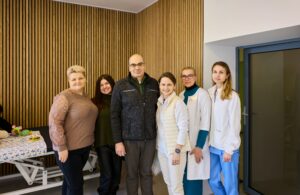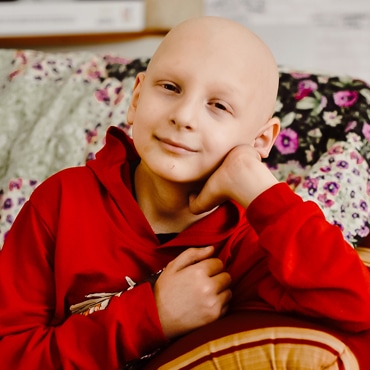


I'm ready to keep fighting,
but I need to know what I'm fighting against
"Emperor of all diseases. Biography of cancer" Siddhartha Mukherjee

The book "The Emperor of All Diseases" Siddhartha Mukherjee we recommend to anyone who wants to get rid of misconceptions about cancer, understand its nature, hear answers to cancer-related questions, and learn to separate truth from myths. This is a fascinating book written by an American scientist, an oncologist of Indian origin. It introduces you to the enemy so that nothing else can prevent you from fighting it.
This is probably the most persistent myth, since it hasn't been a century since cancer was treated. It happened only in the middle of the 20th century. The stereotype "Cancer = death" has been passed down from generation to generation, as humanity has been suffering from cancer since the Stone Age.
Still, there is hope that such a misconception about cancer is losing its power. Even now, at lectures among schoolchildren and students on the symptoms of cancer, we notice that, unlike their parents, children calmly talk about cancer out loud, start discussions, ask questions, and are quite good at separating the truth from myths about cancer treatment. Without feeling the fear that is inherent in the older generation. It's not that young people have no experience of loss. They were simply born at a time when cancer was successfully treated. Plus, knowledge of foreign languages allows them to learn information from primary sources.
Facts:
- According to cancer.gov, as of January 2019, there were about 16.9 million cancer survivors in the United States. This number is projected to increase to 22.2 million by 2030.
- According to the World Health Organization, more than 80% of children with cancer are cured with comprehensive treatment.
Cancer is the name of more than 100 diseases that are treated like any other. But you need to understand that it is individual, like fingerprints. No one can determine how the body will respond to treatment. In modern oncology, the concept of "precision medicine" has emerged, which allows us to select personalized medicines or treatment regimens for patients based on various biomarkers.
For the most part, protocol treatment works, which is also evidenced by global statistics. But even in a situation where the first stage was ineffective, there are second and third lines.
From a statistical point of view, this is true, but it's not that simple. Cancer in children is still rare: about 14 cases per 100,000 children per year. Still, people over 65 are mostly affected. And most of all in developed countries. Is it a paradox? Not at all. It's just that these countries, firstly, have a high life expectancy, and secondly, developed medicine that allows them to diagnose cancer at early stages.
A hundred years ago, people did not live to that age. The fact that in developing countries, the figures are more "optimistic" is due to the lack of a culture of diagnosis and counting patients. It can be assumed that it is in such countries that myths about cancer have taken root.
The main achievement of the 20th century was the prevention of cancer. Controlling the level of environmental pollution, the anti-nicotine campaign, and the popularization of sunscreen significantly reduce the risk of skin or lung cancer, for example.
Facts:
In the 2-3rd century BC, the doctor Claudius Galen lived and had a significant impact on the development of medicine. The methods of this ancient Roman surgeon were practiced until the 17th century. According to his beliefs, health depends on the balance of 4 fluids: blood, phlegm (mucus), yellow bile, and black bile.
Galen linked the onset of cancer and depression to an excess of black bile (which, by the way, was never found). The latter is also called melancholy, which means "black bile" in Greek. Thus, a connection was made between the two diseases of the body and mind.
Therefore, it is not surprising that some people still think that depression, sadness, jealousy, and envy cause cancer.
According to this logic, each of us is in the crosshairs. After all, we are sad and sometimes we can think badly of someone. But not everyone is ill with something. And those who are diagnosed feel guilty: "I got sick because I'm bad."
Yes, we are influenced by various factors: how we live, who our parents are, what we eat and drink. But cancer does not come from a bad mood or character, as this is not scientifically proven.
This is a myth from the realm of witch hunts and the evil eye. It is impossible to explain it rationally, since the proven fact that cancer is not contagious does not change anything.
So when you hear from an educated person in the 21st century: "But you, volunteers, visit the ward so often, aren't you afraid that you will bring home a disease?", you can only shrug.
If only those who think this way knew what an incredibly long and difficult path doctors have traveled to come up with modern chemotherapy methods. How many stereotypes about cancer they had to overcome to finally determine where the truth about cancer treatment lies and where the myth is.
Fasting, soda, vitamins, ashrams, miracle mushrooms.... If everything were so easy and simple, we would have beaten cancer long ago. But the truth is that there is no research on this issue. That's because there is not a single clue that proves that such remedies are capable of such a feat. Experiments on mice have ended badly. And studies that examined the interaction of almond acid and vitamin B (another "recipe" for fighting cancer) together with chemotherapy that affects the peripheral nervous system proved that they seriously increase toxicity.
The consequences of taking cheap natural remedies in the case of pediatric oncology are often more dangerous than in adults. Not to mention the fact that in the end, the blame falls on the shoulders of parents. After all, by refusing "bad" chemistry in favor of a miracle, they take responsibility for the child's life on themselves. Only on themselves. Not the person who sold this or that natural medicine, but only you, because it is your choice.
Therefore, before making such a decision, you should ask yourself a thousand times: "Am I ready to take on this responsibility and do I have the right to do so?"
We can understand the parents' desire to go to the ends of the earth if it will only help their child. Still, no amount of good intentions can justify their actions if something irreversible happens.
No matter how difficult it is, you should not blindly believe other people's advice. You shouldn't even rely on the opinion of one doctor - ask another, or better yet, two or three. Only after you hear answers to all your questions from different perspectives should you decide what to do next. Doubt is a good cure for delusion.
The scientific world is getting closer to getting rid of cancer. And this gives us hope.

Psychological support hotline fromPledges» the number 0 800 4000 23 is available: